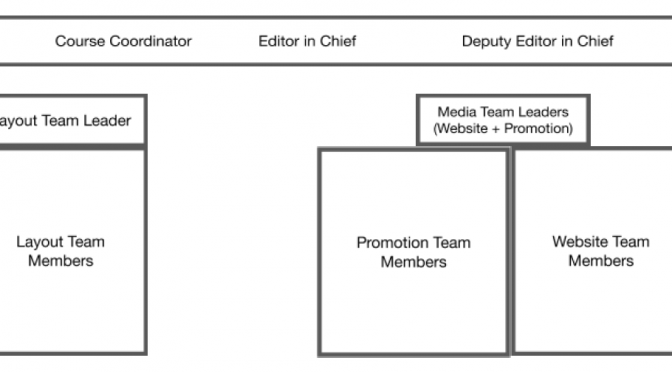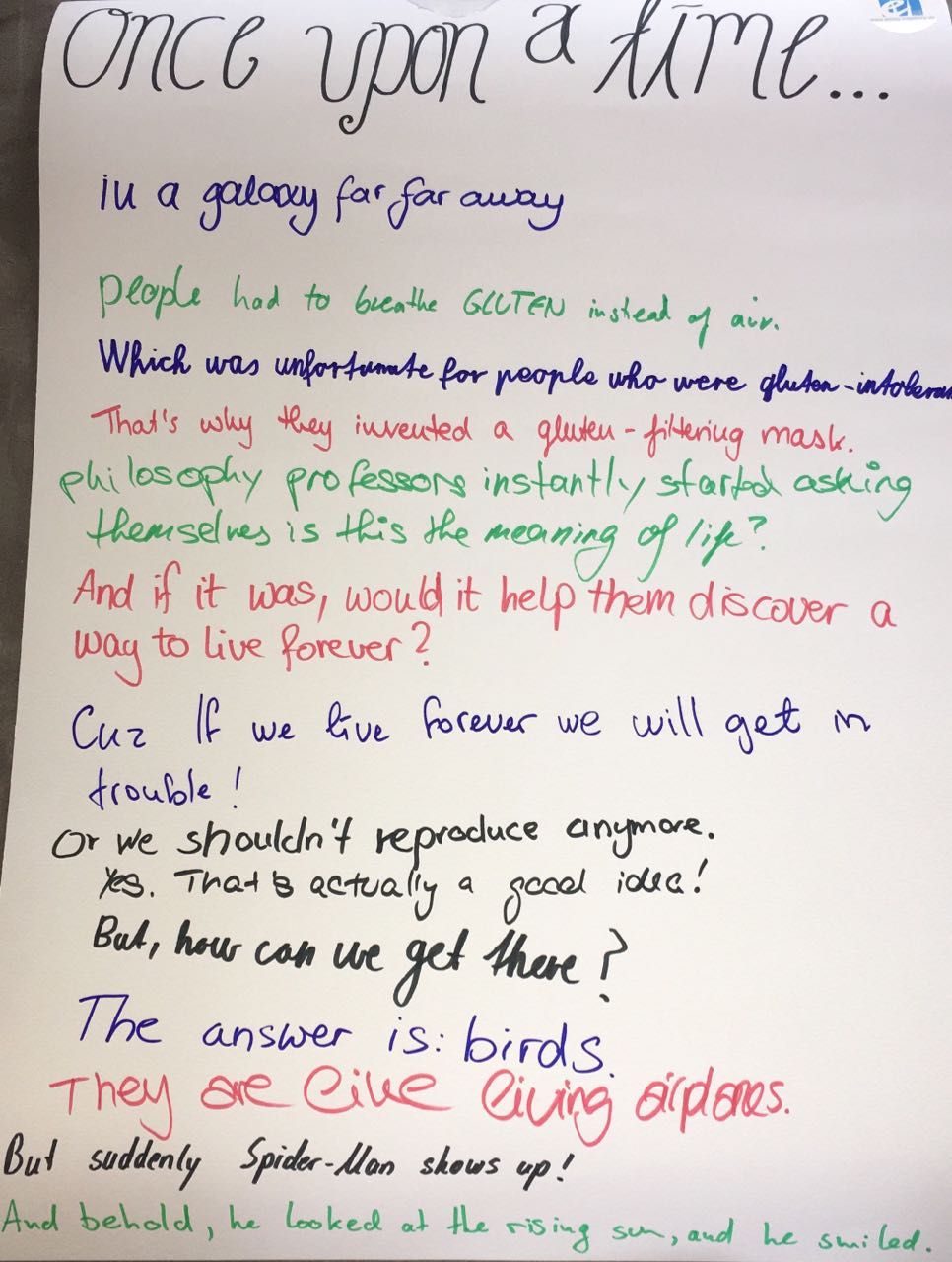The new issue of eMAG is out! Grab your copy in front of the Alte Cafete from July 8 (while supplies last).
Tag: emag
eMAG #43
eMAG #42
eMAG #41
Questions to the Augsburg Magazine eMAG
- What exactly is the course called and how does it fit into the study program? What English skills are being covered? And how do you learn the required writing skills?
The course has a rather unspectacular name: it goes by Integrated Language Skills (LPO 2012) / Integrated Language Skills 2 (LPO 2008) (eMag). eMAG is part of a module that consists of three courses, the other two being Effective Writing and Übersetzung Englisch-Deutsch (1). eMAG fits in here as an opportunity for students to put the skills they have learned in those other courses to practical use in an authentic, english-speaking environment. The eMAG course itself is there to improve students’ writing skills outside of the usual term paper style. We try to convey a more informal writing style in general.
- eMAG has a very project-based way of practising writing skills. Would you say this is more promising for participants than a traditional class?
I’m going to go with the diplomatic route here and say that a good mix between a theoretical approach and a practical one is very useful. You can’t learn a language simply by reading about it. You have to use it to actual get better at it. And a part of that certainly is writing, too, in all its forms. But at the same time, it’s also necessary to have a good foundation to start working on a project like eMAG. You need to have some basic understanding of how to structure your writing, that there are differences between writing in German and English – and that does include formal differences. And that is something we wouldn’t be able to do in just one term with one session a week. In a nutshell, I’d say that eMAG is a great opportunity if you have the necessary foundations.
- For us, organisational tasks took up a lot of time and it wasn’t quite clear who was responsible for what. Also, what presented a bit of a struggle was that our course is supposed to teach writing skills before all else but the magazine focus didn’t allow much time for that. How do you handle organizational tasks within a writing course?
It’s good to see that similar projects are struggling with similar problems. There is no way around it and I was lucky enough to join the course at a time when a lot of these issues had already been dealt with and solved. There already was a good routine that people before me had set up. The trick is to give the course a real project structure with different layers of who would be responsible for what – teams for layouting and media and advertisement to just name a few. Within these groups, the regular members, who take the course for credit points, will mostly focus on writing and only take on smaller tasks to help create the final magazine. The experienced staff, on the other hand, get clear assignments on what needs to be done. In the end, the editor-in-chief has the fun task of managing and overseeing all those groups and bringing everything together.
- Who is eligible to join the class, i.e. students of what semester or year of the study program? How many are you in total and what is the ratio between students who do the course voluntarily and those who do it for credit points? Do both of these groups participate in the same way?
There is no real condition set for joining the class, especially if you’re studying English: if you need the credit points, who are we to tell you you can’t come? We do prefer for the people to have completed the writing part of the module beforehand, or at least to be taking that class in the same term, but we can’t enforce that. Naturally, though, most people are doing it this way because following the module structure makes the most sense. In turn, that means that most new members are in or around their 3rd semester. In terms of how many people join, there’s some fluctuation: there are usually more participants during winter terms, but it’s roughly 20-25 people in general. Only few of these aren’t English students – although I wouldn’t say there’s a difference in participation. On top of that, there is my team which consists of seven people at the moment. These tend to be people who have participated before and can’t get any more credit points. They are just there for a good time.
- In our course, we tried to assign different roles to different people. However, we didn’t define clearly enough what each role’s job was, leading to the point where some people did much more work than others. What roles do you have within your team? And what tasks does each role involve? Is the work distributed in a rather even way, or are there also differences between the work load of different people?
I think this little chart from our guidelines does a better
job at visualizing this than I could in words:
The new members are being split into either working on layouts or promoting the
magazine, apart from working on their articles. Both teams are supervised by
team leaders who know how everything is supposed to be structured and help out
wherever necessary. If even they don’t know the solution, it’s usually my part
to figure something out. Problem solver would probably be one of the better
descriptions for what I do. There is a lot of organizing things behind the
scenes, too, of course: finding printers, organizing everything to be in line
with our university and making decisions on how to go forward or cutting
inappropriate articles, though we do try to avoid that at all costs.
Nonetheless, it happens every once in a while.
We struggled a lot to find a good balance between the workload of the layout team compared to the media team. Layouting is just such a time-consuming but necessary part of it all that it makes it difficult to cut down on it, yet the media team usually doesn’t face quite as many tasks throughout the term. Last term we struck a good balance by giving each member of the Media team the task to write one additional article which would be published on our website while the layout team didn’t get that assignment. This lead to the workload being evened out for the most part.
Apart from that, there’s Writing Support, a team that consists of three experienced eMAGgers. Their job is to correct early drafts and give feedback, before the final draft goes to the course coordinator.
- What does your lecturer do exactly? What is their role in the production of each magazine? And how do they grade each person’s work?
The entire course is supposed to be run by students. But as we wouldn’t be allowed to give people credit, Mr. Jehle is the one who’s in charge officially. Until last term, it was Mr. James, who founded eMAG. The lecturer’s job is to organise exams and talk to the higher-ups of our university in case there are issues we couldn’t solve by ourselves. They also correct final article drafts so we do get some professional feedback.
As for grading, that’s a mystery, even to me. I think it’s really just magic…
Ideally, though, we would love to be able to grade the work during the course
and skip the exam entirely, but as we are part of the entire three-part module
structure, we have to offer an exam which is also created by our course
coordinator. Since the class takes up more time than a regular course, though,
we try not to put additional work on participants for exam preparation. The aim
is to create an exam that can be answered relatively easily by any regular
class member.
- We heard that your editors are meeting every week with the lecturer – what is being discussed in those weekly meetings?
Another rather boring answer: it’s just to catch up on things that are going on. Making sure nothing’s being overlooked or forgotten about. Mr. James’ experience in this matter was invaluable. He didn’t encounter most problems for the first time, so he knew how to handle things if something went awry. And there tends to be at least one thing each term that does.
- How do you organize the advertisement for your magazine?
At this point, we have a few contract partners that have been advertising in eMAG for a long time, which makes the process a lot easier: they know exactly what needs to be done once we come around and ask if they’re still interested. The process consists of two steps: first off, we need to get the contracts signed by our partners who then in turn will send us their ad. This ad is then being handled like a regular magazine page and copied into inDesign. After that, we need to deal with the entire bureaucratic process of handing in the contracts to our university. The people in charge then check if they are all legally printable and if any mistakes have been made. If everything is found to be in order, they write the bill.
- Our first magazine didn’t have a general topic, and everyone just wrote about whatever they were interested in. However, we think it will be better if our magazine has that kind of topic for each semester’s edition from now on. How do you decide on a topic for each term?
That’s one of the funnier parts of class! During one of the last sessions each term we dedicate one hour to brainstorming ideas on what could be interesting as a topic. It must be a topic that hasn’t been covered yet, of course. Once we have a list of potential topics, everyone gets to vote on what will be the Main Topic for the following issue. We usually go with that decision, but I remember a few terms ago when more than 90% of people voted on a topic that we ended up not taking. My deputy and I decided on the topic Misfits instead, although that topic only had two votes, coming from the both of us. Guess that’s one of the few perks of being editor-in-chief.
- How do you manage a deadline as early in the semester as one month after it started? And what do you do afterwards?
For everything to go as smoothly as possible, the team and I sit down during the term break to plan everything out with a very strict schedule. Experience, of course, already plays into this, so we kind of know how well some deadlines will work out or how much time you really need to give people with certain assignments to get reasonable results. Then, one week before the term actually starts, I write an e-mail to the course and give the participants all the details, so everyone is already well-prepared and know what’s coming. That method has been working out for us pretty well.
- Do some of your Lehramt students plan on using the skills and ideas from your magazine project later on, in the school classroom?
As I’m not going to become a teacher, I can only make assumptions here, but I think working in a team project like eMAG definitely makes organizing a bit easier later on, when you want to get anything done with a horde of 30 pupils. I look at it realistically, though, and say that it’s most likely not going to be a magazine in and of itself. What is useful, I would imagine, is the skills you learn without even noticing for the most part: Working in a team, problem solving, time management. Skills that are becoming more and more important in our society. So maybe that is our little contribution to the development of our students in the course. I, at least, hope so and, most importantly, that it’s a fun time for everyone in what’s otherwise often a very monotonous university day.
eMAG’s Facebook dilemma
So, turns out Facebook might be a shady company. I know. Who’da thunk? While private users have begun to jump ship or at the very least to post memes about Mark Zuckerberg’s peculiar way to drink water, public pages – like eMAG – are having to make a pretty tough decision.
Yet another Facebook scandal
Alright, let’s start with a very brief, by no means, complete summary. Facebook is collecting user data, and this goes quite a bit deeper than what some people like to admit. Call logs, contact lists, even where people live. Pretty useful stuff, one might say. Would come in handy if you were to – oh, I don’t know – create ads to sway people’s opinion on stuff like the 2016 Brexit vote or certain presidential candidates in the US. Well, Cambridge Analytica found a way to collect this data and sold it to customers who in turn used it for… You can do the math. Of course, Mark Zuckerberg distanced himself from these practices in the senate hearing last month, but whether his company will change its data-guzzling ways is more than doubtful.
The convenience of networks
And this is where we all come in, actively this time. The development of Facebook’s user base hasn’t really changed all that much following the latest scandal, but a number of influential personalities have openly encouraged people to delete their account, for example Elon Musk, the CEO of Tesla and Space X. So there is at least a chance that the already sub-optimal public opinion about Facebook could lead to people leaving. The problem is, where to?
You see, people have been concerned about Facebook for a long time, but we’re all so invested in its ecosystem that moving on from it seems like a huge step. You’d have to find services that can do everything you’ve found in Facebook, WhatsApp and Instagram. And ideally, they should have a user base as all-encompassing as these apps, too. Facebook is all about being convenient. Looking for capable alternatives and convincing your family, friends and colleagues to actually use them is anything but that.
Ties that bind
For eMAG the issue is similar, but with a slight twist. For us Facebook’s massive reach means that we can use those existing networks to get word going when we have a promotion event, a new article ready, or our latest issue around the corner. People who are interested share it and all of a sudden 200 people most of our team members have never seen know our release date. That’s just neat! But doesn’t that also mean that we encourage people to stick around on a platform that has done enough shady stuff to deserve being shunned indefinitely?
We’re not pretending that we’re as big as Kanye, but this definitely is a problem that every influencer and page administrator on Facebook needs to be aware of. If you use Facebook for promotion, you bind people to that system and it’s gotten really tough to justify that now.
 To leave or not to leave…
To leave or not to leave…
So, this is where we’re at. If we quit Facebook, we take the moral high ground. We also throw away most of the promotion work we’ve done since the magazine’s inception. If we stay, we are able to reach a modest, but ever-growing number of readers and can hope to reach people outside the campus on a regular basis.
If you know of any alternatives, please drop us a line, through Facebook, if need be. Every social network has to start with just a handful of users. Maybe you are one of them. We’re definitely open for a service that respects its users.
Text & Picture: Andreas Böhm
Once upon a time …
At our promotion event last week, we had people at our booth contribute to fun short stories. Contributors only were able to see the last sentence or phrase and were asked to continue the story. See what we got out of it. Maybe you’d even like to add to the last one that’s still unfinished. Join us on Facebook and continue the story in the comments’ section.
Once upon a time…
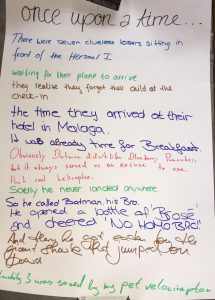 There were seven clueless losers sitting in front of the Hörsaal I waiting for their plane to arrive, they realized they forgot their child at the check-in. The time they arrived at their hotel in Malaga it was already time for breakfast. Obviously Batman didn’t like Blueberry Pancakes, but it always served as an excuse to use that cool helicopter. Sadly he never landed anywhere. So he called Batman, his Bro. He opened a bottle of ‘Brosé’ and cheered “NO HOMO BRO!!” and then he got eaten by the giant shark that jumped on board, luckily I was saved by my pet velociraptor.
There were seven clueless losers sitting in front of the Hörsaal I waiting for their plane to arrive, they realized they forgot their child at the check-in. The time they arrived at their hotel in Malaga it was already time for breakfast. Obviously Batman didn’t like Blueberry Pancakes, but it always served as an excuse to use that cool helicopter. Sadly he never landed anywhere. So he called Batman, his Bro. He opened a bottle of ‘Brosé’ and cheered “NO HOMO BRO!!” and then he got eaten by the giant shark that jumped on board, luckily I was saved by my pet velociraptor.
Once upon a time..
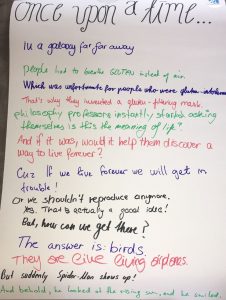 In a galaxy far far away people had to breathe GLUTEN instead of air which was unfortunate for people who who were gluten-intolerant. That’s why they invented a gluten-filtering mask. Philosophy professors instantly started asking themselves is this meaning of life? And if it was, would it help them discover a way to live forever? Cuz if we live forever we will get in trouble! Or we shouldn’t reproduce anymore. Yes, That’s actually a good idea! But how can we get there? The answer is: birds. They are like living airplanes. But suddenly Spider-man shows up! And behold, he looked at the rising sun, and he smiled.
In a galaxy far far away people had to breathe GLUTEN instead of air which was unfortunate for people who who were gluten-intolerant. That’s why they invented a gluten-filtering mask. Philosophy professors instantly started asking themselves is this meaning of life? And if it was, would it help them discover a way to live forever? Cuz if we live forever we will get in trouble! Or we shouldn’t reproduce anymore. Yes, That’s actually a good idea! But how can we get there? The answer is: birds. They are like living airplanes. But suddenly Spider-man shows up! And behold, he looked at the rising sun, and he smiled.
Once upon a time..
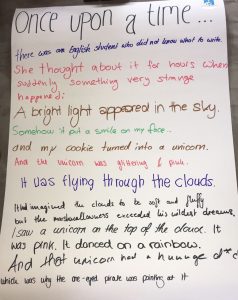 There was an English student who did not know what to write. She thought about it for hours when suddenly something very strange happened: A bright light appeared in the sky. Somehow it put a smile on my face.. and my cookie turned into a unicorn and the unicorn was glittering&pink. It was flying through the clouds. I had imagined the clouds to be soft and fluffy but the marshmallowness exceeded his wildest dreams. I saw a unicorn on the of the land. It was pink. It danced on a rainbow. And that unicorn had a huuuge d*ck which was why the one-eyed pirate was painting at it.
There was an English student who did not know what to write. She thought about it for hours when suddenly something very strange happened: A bright light appeared in the sky. Somehow it put a smile on my face.. and my cookie turned into a unicorn and the unicorn was glittering&pink. It was flying through the clouds. I had imagined the clouds to be soft and fluffy but the marshmallowness exceeded his wildest dreams. I saw a unicorn on the of the land. It was pink. It danced on a rainbow. And that unicorn had a huuuge d*ck which was why the one-eyed pirate was painting at it.
Once upon a time..
there was free campus-coffee but behold! It was poisoned by a giant purple dragon’s claws. The wizard managed to destroy it. Out of thin air a beautifully-glittering fairy appeared and started rapping drake and got crazy about it because her grandma used to do that because she was the most badass woman he ever met because she’s fond of adventures …. [continue for us on FB]

